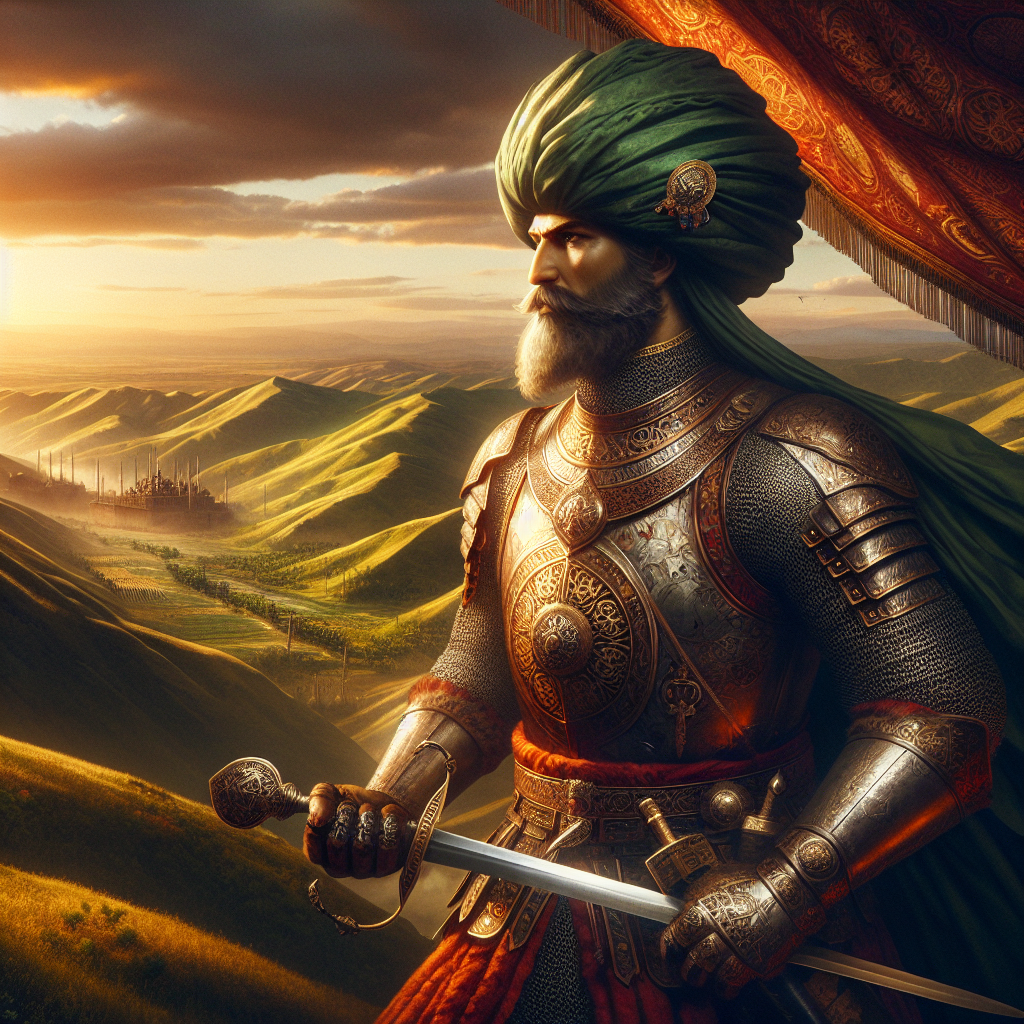Osman Ghazi, revered as the founding father of the Ottoman Empire, was instrumental in laying the groundwork for a cultural and political entity that would influence world history for over six centuries. His reign not only set the stage for territorial expansion but also established the cultural and ideological pillars of the empire that persisted through generations. History enthusiasts will find his story woven intricately with the cultural elements he fostered, which defined the empire’s identity and spirit.
Osman’s significance extends beyond his military conquests; he was a visionary leader who recognized the power of culture in unifying diverse Turkic tribes under a common identity. His role in shaping Ottoman culture was pivotal, as he blended Turkish nomadic traditions and Islamic values. This fusion created a distinct Ottoman identity that embraced both its Turkish roots and the Islamic faith, enriched further by Byzantine influence.
Osman’s Role in Shaping Ottoman Identity
Osman Ghazi’s leadership was a harmonious blend of Turkish nomadic traditions and Islamic principles. Born into the Kayi tribe, Osman was deeply rooted in Turkish customs that emphasized values such as bravery, loyalty, and hospitality. These traits became part of the fabric of Ottoman society, reflecting in their governance and military ethos. His reign marked the birth of a unique Ottoman identity, which amalgamated Turkish, Islamic, and Byzantine influences—a testament to his cultural vision.
The diverse Turkic tribes, initially fragmented, found unity under Osman’s leadership. His cultural foresight was vital in forging a new identity that transcended tribal affiliations, setting the stage for the rise of a formidable empire. Osman’s dream was not merely to conquer lands but to create a cohesive society where cultural diversity was celebrated and harnessed for the empire’s strength and stability.
The Influence of Turkish Nomadic Traditions
Osman’s roots in the nomadic Kayi tribe deeply influenced his leadership style and the early Ottoman state. Turkish nomadic customs, characterized by their flexibility and adaptability, became foundational in Ottoman governance and military structure. The beylik system, where tribal leaders held significant autonomy and authority, mirrored these traditions and was integral to the early administrative framework.
The legacy of Oghuz Turkic heritage in Osman’s reign was evident through the emphasis on community values such as hospitality and loyalty. The social organization of the early Ottoman state reflected these customs, where communal ties and kinship played a crucial role in societal cohesion. These traditions also influenced the military, where brotherhood and bravery were highly valued and contributed to the formidable nature of the Ottoman forces.
Islamic Influence on Ottoman Culture
Islamic values and the integration of Sharia law were central to the foundation of the Ottoman state under Osman. His leadership saw the incorporation of Islamic principles into governance and everyday life, shaping the empire’s social norms and moral compass. Religious leaders like Sheikh Edebali were influential in Osman’s court, providing spiritual guidance that reinforced the Islamic framework within the empire.
Islamic education flourished during and after Osman’s reign, with the establishment of madrasas that became centers of learning and culture. The promotion of Islamic law not only defined the legal structure but also unified the diverse populations within the empire under a common religious and ethical code. This integration of Islamic values ensured that the Ottoman state remained a bastion of Islamic civilization.
The Role of Sufism in Ottoman Culture
Sufism played a significant role in shaping the spiritual and moral direction of the early Ottoman Empire. Osman Ghazi’s relationship with Sufi leaders, particularly Sheikh Edebali, underscored the influence of Sufi teachings in his rule. The Sufi orders, or tariqas, were integral in promoting values such as tolerance, humility, and community service, which became hallmarks of Ottoman society.
The Bektashi order, in particular, had a profound impact on the Ottoman military, especially the Janissaries, who adopted Sufi practices and ideologies. This spiritual dimension provided a moral foundation that inspired loyalty and discipline within the ranks, contributing to the military’s success and cohesion. Sufism’s emphasis on inner spirituality complemented the external expansion of the empire.
Architectural Foundations: The Beginnings of Ottoman Architecture
The early architectural style during Osman’s reign laid the groundwork for the grand structures that would later define Ottoman architecture. This period saw the establishment of mosques, religious schools, and public buildings, reflecting the dual influences of Turkish and Islamic aesthetics. Notable early structures like the Orhan Gazi Mosque exemplified the synthesis of these cultural elements.
Architecture served as a visual representation of the Ottoman identity, merging function with form to create spaces that embodied the empire’s spiritual and cultural ethos. These early edifices became the blueprint for future architectural achievements, showcasing the Ottomans’ commitment to cultural expression and continuity.
Cultural Exchanges with Byzantine Influence
Osman’s reign marked the beginning of cultural exchanges with the Byzantine Empire, which profoundly influenced the Ottoman state. The adoption of Byzantine administrative practices and military strategies was strategic, enabling a smoother transition and integration of conquered territories. This pragmatic approach fostered stability and growth within the expanding empire.
Byzantine art and architecture also left an indelible mark on early Ottoman territories, particularly as cities like Bursa transitioned from Byzantine to Ottoman control. The mingling of Byzantine and Ottoman elements created a rich cultural tapestry that enhanced the empire’s diversity and appeal.
Language and Literature in Early Ottoman Culture
Language played a crucial role in the early Ottoman state, with Osman Ghazi utilizing Turkic dialects to govern and communicate effectively. This linguistic fusion incorporated Arabic and Persian influences, reflecting the broader Islamic scholarly traditions. The rich literary culture of the time included poetry and storytelling, which helped shape the Ottoman cultural identity.
The interplay of languages and literary forms under Osman’s leadership fostered a vibrant intellectual environment that celebrated cultural diversity. This tradition of literary excellence continued to flourish, contributing to the empire’s cultural legacy and intellectual achievements.
Festivals, Customs, and Social Life
Under Osman’s leadership, the continuation of Turkic festivals and customs was essential in maintaining social cohesion and cultural continuity. Celebrations of victories, religious holidays like Eid, and tribal gatherings reinforced communal bonds and reflected the empire’s cultural heritage.
Hospitality and communal values were central to Ottoman social life, drawing from both Turkic and Islamic traditions. These customs promoted a sense of belonging and unity, essential for the diverse populations within the empire.
Osman’s Legacy in Shaping Ottoman Cultural Identity
Osman’s blending of Turkish, Islamic, and Byzantine influences created a unique and enduring Ottoman culture. The values he established, including justice, loyalty, and religious devotion, became the bedrock of the empire’s identity and governance. These cultural foundations facilitated the empire’s growth and cohesion over the centuries, leaving a lasting impact on the broader Islamic world and European history.
Reflecting on Osman Ghazi’s Legacy
Osman Ghazi’s legacy is a testament to his role in laying the cultural foundation of the Ottoman Empire. His leadership and visionary approach to integrating diverse cultural elements created a lasting identity that defined the empire for generations. The early Ottoman culture he cultivated not only shaped the empire’s trajectory but also left an indelible mark on the global historical landscape.
Read More :: Read More Osman Ghazi Blog.
Osman’s Dream: The History of the Ottoman Empire
A books on Osman Ghazi, the Ottoman Empire, and related historical themes available on Amazon that may interest you:
Author: Caroline Finkel
Link: Osman’s Dream








